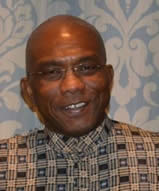Message from the Conference Chairperson
 Welcome to the first in a series of Caribbean conferences that address the theme Population Issues and Dynamics: Theory, Practice and Policy for the Post 2015 SDGs. During 7-9 January 2016, the conference will feature formal research papers, plenary presentations and roundtables addressing a wide cross-section of critical sub-themes deemed relevant as we strive to advance and augment formal knowledge about population-related issues, population dynamics and their implications for practice and policy in Trinidad and Tobago. In 1973, a similar conference was convened in The University of the West Indies, st. Augustine due principally to the phenomenal influence of internationally acclaimed Caribbean demographers such as Professor George Roberts, Jack Harewood and Norma Abdulah; all of whom were members of staff of the university.
Welcome to the first in a series of Caribbean conferences that address the theme Population Issues and Dynamics: Theory, Practice and Policy for the Post 2015 SDGs. During 7-9 January 2016, the conference will feature formal research papers, plenary presentations and roundtables addressing a wide cross-section of critical sub-themes deemed relevant as we strive to advance and augment formal knowledge about population-related issues, population dynamics and their implications for practice and policy in Trinidad and Tobago. In 1973, a similar conference was convened in The University of the West Indies, st. Augustine due principally to the phenomenal influence of internationally acclaimed Caribbean demographers such as Professor George Roberts, Jack Harewood and Norma Abdulah; all of whom were members of staff of the university.
More than forty years later, due principally to the Caribbean Cluster on Population and Sustainable Development, demographic and population issues are again taking centre-stage in Trinidad and Tobago. A new generation of scholarship drawing on formal demography, population studies, social policy, applied social statistics, monitoring and evaluation and development studies, has been emerging in the Sir Arthur Lewis Institute of Social and Economic Studies, largely as a result of its Master of Science in Development Statistics; a novel programme that is indeed the catalyst for the emergence of the Caribbean Cluster on Population and Sustainable Development.
In essence, the conference celebrates and reinforces the inter-disciplinary character of demography and population studies. It has attracted contributions from social workers, gerontologists, psychiatrists, community health specialists, physicians, economists, geographers, sociologists, gender specialists, education researchers, food scientists and specialists in management studies, among other disciplines. More important, it brings to the fore critical intersections across a the full range of disciplinary interests in emphasizing and demonstrating associated linkages with practice and policy in response to emergent population issues and dynamics.
As the Chairperson of the Conference and a principal researcher in the Caribbean Research Cluster on Population and Sustainable Development, I hope that this conference will stimulate interest in the research activities of the cluster and permit its membership to grow. I expect that as the Cluster continues to convene its country-specific conferences, new members will join and pursue research that places human beings as individuals and as members of an infinite range of sub-populations, at the forefront. I also wish to facilitate the publication of papers presented in this conference providing that they meet the qualitative standards for publication and approval is received from respective authors. This venture would add to the formal literature on population issues and dynamics in Trinidad and Tobago and further, provide keen insights that favourably inform practice and policy direction consistent with local development thrusts beyond 2015.
With the growth and institutionalization of the Cluster, I expect it to thrive in accordance with sustainable practices and continue to ensure that there is a cadre of adequately trained professionals with training in demography, population studies, applied social statistics, social policy, monitoring and evaluation and development studies; a cadre of professionals who could collaborate with other specialists with allied interests in a host of population-related issues. Collectively, I expect them to constitute a regional “think tank” on matters pertaining to population issues and dynamics in the Caribbean Sub-Region and as such, provide technical assistance and facilitate institutional strengthening initiatives within public sector settings.
In conclusion, I wish to especially welcome tertiary-level students and students preparing for Caribbean Advance Proficiency Examinations (CAPE) to the conference. I hope that the conference proceedings will expose them to the rich display of research and formal knowledge that would facilitate their studies and quest for Caribbean-specific study materials. Moreover, I hope that the conference will also provide them with yet another set of alternative career paths. Too often, career guidance seminars are hosted without any reference to careers such as demographer, statistician, social policy analyst, development specialist, monitoring and evaluation specialist, to name a few. As such, the conference provides a forum for the display of specialized skills that are already in great demand on a global scale, increasingly gaining prominence in Trinidad and Tobago, and poised to intensify beyond 2015. Hopefully, the conference will be a forum that draws students towards disciplinary foci and prospective career paths that otherwise would have never been imagined
Altogether, the Conference Organizing Committee has expended tremendous effort to ensure that the conference is associated with high quality output and meaningful outcomes. We look forward to your frank feedback and could only hope that all participants have worthy experiences.
Dr. Godfrey St. Bernard
Senior Fellow
Sir Arthur Lewis Institute of Social and Economic Studies
The University of the West Indies
St. Augustine

